Russia and Azerbaijan’s narrative warfare against Armenia’s European path
Russia and Azerbaijan deploy aligned narratives to undermine Armenia’s partnership with the West
Russia and Azerbaijan’s narrative warfare against Armenia’s European path
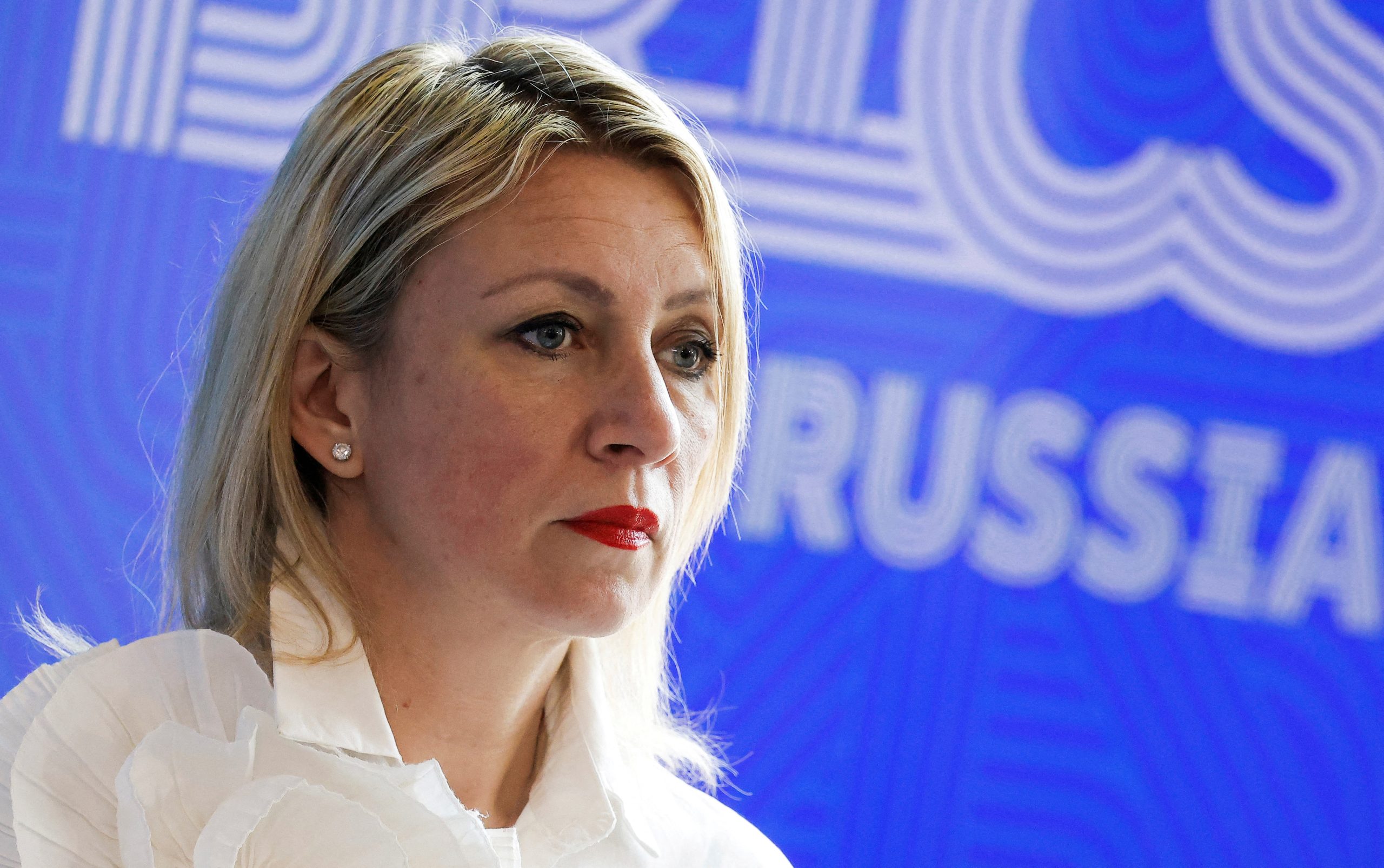
Banner: Russian Foreign Ministry spokesperson Maria Zakharova attends a press conference held by Foreign Minister Sergei Lavrov on the sidelines of a meeting of foreign ministers of the BRICS group of nations in the city of Nizhny Novgorod, Russia, June 11, 2024. (Source: Reuters/Maxim Shemetov/File Photo)
New analysis from DFRLab demonstrates how leaders from Russia and Azerbaijan often promote closely aligned, and at times identical, narratives hostile to Armenia’s efforts to improve relations with the European Union. Nearly every positive development in the relationship between Brussels and Yerevan prompts a negative response from Moscow and Baku, and state-controlled or state-aligned media in Russia and Azerbaijan frequently amplify each other’s anti-Armenian and anti-EU rhetoric. This alignment indicates that both actors may be employing a similar narrative strategy to undermine Armenia’s pro-Western aspirations.
Armenia’s improved relationship with the European Union is marked by several notable milestones from the last few years. In 2021, the EU-Armenia Comprehensive and Enhanced Partnership Agreement officially came into force, laying the groundwork for deeper cooperation. In 2022, Brussels deployed the European Monitoring Capacity (EUMCAP) mission to Armenia, aiming to reduce tensions along the Armenia-Azerbaijan border. In 2023, Armenia’s ratification of the Rome Statute was warmly welcomed by the European Union as a step toward strengthening international justice. In 2024, the EU began discussions on easing visa requirements for Armenian citizens, fostering people-to-people connections and cultural exchange. These developments positively influenced Armenian perception of the European Union: By 2023, surveys showed that 60 percent of Armenians trusted the European Union, reflecting growing alignment with European values. In contrast, only 33 percent of Armenians expressed trust in the Russia-led Collective Security Treaty Organization (CSTO), highlighting a shift in attitudes and priorities.
Russia and Azerbaijan share a common interest in opposing Armenia’s closer relationship with Europe. Russia aims to prevent Armenia from reducing its dependence on Moscow, while Azerbaijan seeks to preserve the regional balance of power by undermining Armenian investments in national defense and resilience. The two countries pursue these goals through coordinated action in the information space, deploying similar narratives to challenge Armenia’s shift toward the West.
Russian and Azerbaijani disinformation campaigns targeting EUMA
In 2023, following an official request from the Armenian government, the European Union established the EU Monitoring Mission (EUMA) on Armenia’s side of the international border with Azerbaijan. Tasked with monitoring and reporting on-the-ground developments, the EUMA aims to enhance human security in conflict-affected areas and support confidence-building between Armenia and Azerbaijan. However, the EUvsDisinfo database highlights how disinformation campaigns frequently target the EUMA.
DFRLab’s analysis reveals the closely aligned rhetoric that Russia and Azerbaijan use to discredit the EUMA. In March 2024, Russian Foreign Minister Sergey Lavrov accused the EUMA of becoming a NATO mission due to the involvement of personnel from Norway, Canada, and the United States. Similarly, in September 2024, Azerbaijani President Ilham Aliyev claimed that by including Canadian representatives, the EUMA had transformed itself into a NATO mission.
This was not the first instance of aligned messaging against the EUMA. In March 2023, Russian Foreign Ministry Spokeswoman Maria Zakharova alleged that the EUMA was spying on Russia, Iran, and Azerbaijan from Armenia, contributing to increased “tensions” in the region. Echoing this, President Aliyev accused the EUMA of engaging in “binocular diplomacy.” Additionally, Azerbaijan’s First Deputy Defense Minister, Colonel-General Karim Valiyev, claimed that the EUMA was worsening the situation in the South Caucasus.
The DFRLab used the Meltwater tool to analyze mentions of the EUMA in Russian and Azerbaijani media outlets and discovered that both actively covered the EUMA in February and March 2024. Interestingly, these outlets published a similar number of articles about the EUMA on specific days, suggesting a comparable level of interest in the topic. These articles primarily contained narratives intended to discredit the EUMA.
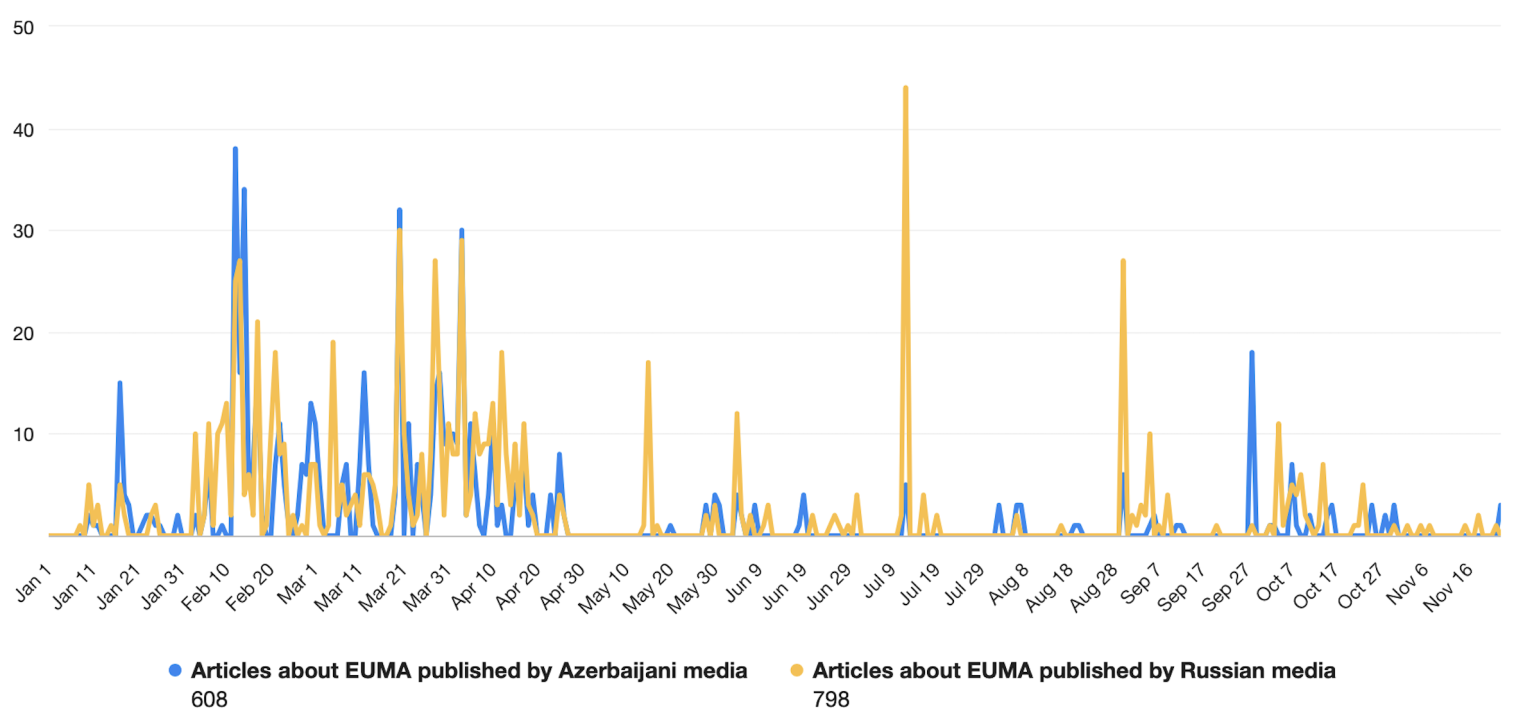
Two instances when Azerbaijani and Russian media reporting on the EUMA reached similar peaks—on March 20 and April 4, 2023—coincide with Zakharova’s statements about the EUMA. In addition, Zakharova’s statement on April 3, in which she claimed that the EUMA was becoming a NATO mission, also occurred ahead of Armenia’s trilateral meetings in Brussels on April 5.
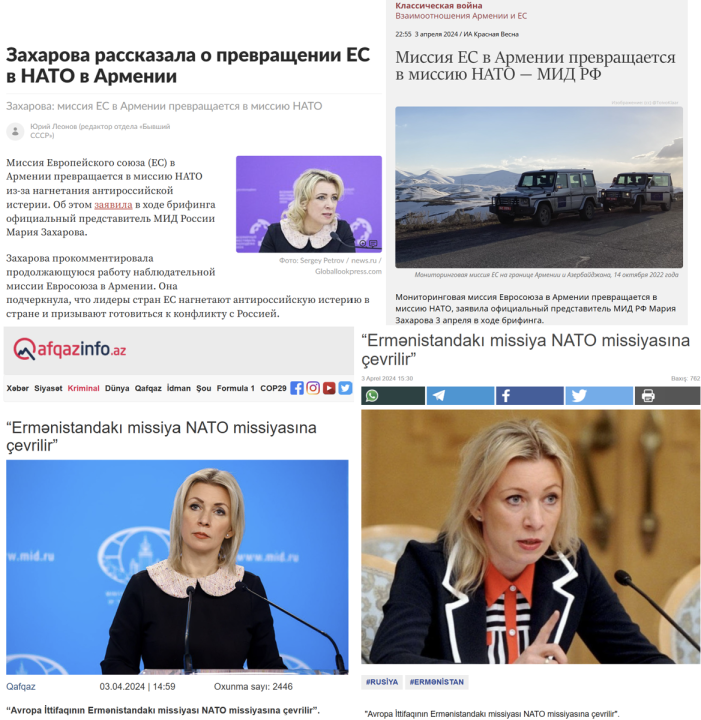
Russia and Azerbaijan respond to France’s decision to provide Armenia with weapons
In recent years, France has become a key partner for Armenia, providing advanced military equipment to strengthen its defense amid regional challenges. In February 2024, the two countries signed defense agreements focusing on arms procurement, military training, and air defense. In June, Armenia signed a contract to purchase CAESAR self-propelled howitzers from France, making it the first NATO and EU state to supply weapons to Armenia despite its CSTO membership. Both nations stressed that these capabilities are intended solely for defense.
France’s decision to supply weapons to Armenia quickly drew negative and closely aligned reactions from Azerbaijan and Russia. On November 21, 2023, Azerbaijani President Ilham Aliyev claimed that France was “laying the groundwork for a new regional war” by arming Armenia and accused France of destabilizing “not only its past and present colonies but also our region, the South Caucasus.” Similarly, Russia’s Ministry of Foreign Affairs accused France of provoking renewed armed conflict in the region. Spokeswoman Maria Zakharova suggested that France, having failed in its peacekeeping efforts in Africa, was attempting to compensate by taking on a peacemaking role in the Caucasus.
The DFRLab observed that when France and Armenia signed defense agreements on February 24, Russian and Azerbaijani media published nearly the same number of articles on the event (130 and 127, respectively). Coverage on the topic spiked again in June 2024, following the announcement of Armenia’s purchase of CAESAR howitzers from France. Azerbaijani media prominently featured statements by Maria Zakharova, while Russian outlets extensively reported on Ilham Aliyev’s remarks on the matter. Interestingly, when President Aliyev accused France of laying groundwork for a new war in November 2023, his statement received broader coverage in Russian media than in Azerbaijani outlets. Our analysis identified 51 mentions of Aliyev’s statement in Azerbaijani media, while the Russian query yielded 111 results.
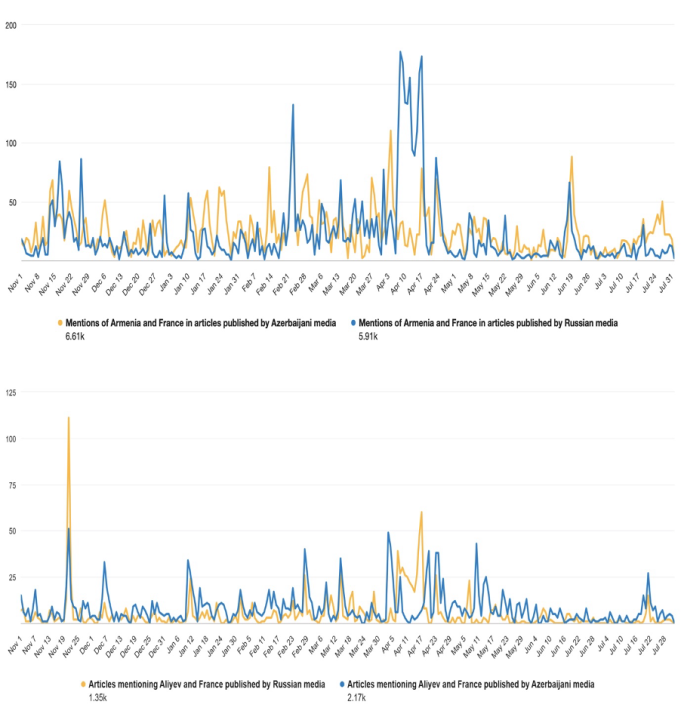
The majority of Azerbaijani-language coverage of Aliyev’s remarks spotlighted his accusations against France for practicing neocolonialism. State-controlled and pro-government Azerbaijani media framed their reporting to emphasize France’s colonial past, aligning with a broader narrative promoted by Aliyev as well as the Russian foreign ministry. This rhetoric aims to discredit France and its partnership with Armenia by portraying France as a hypocritical power that criticizes others while neglecting to address its own history of exploitation and colonialism. For instance, state-run and pro-government outlets ran headlines such as “President of Azerbaijan: Most of the bloody crimes in the history of colonialism of humanity were committed by France,” and “President: Although centuries have passed, the shameful new methods of French colonialism continue today.” This framing reinforces a narrative designed to undermine France’s image in the region and delegitimize its support for Armenia.
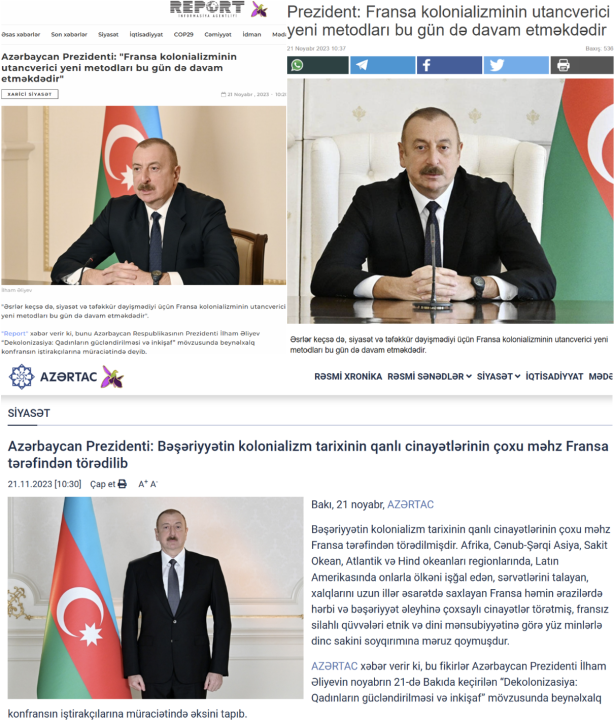
Aliyev’s speech received extensive coverage in Russian state-controlled and pro-government media, with 111 articles published on November 21 alone—double the number of reports in Azerbaijani-language outlets. The Azerbaijani state-run Azertag highlighted the scale of Russian media coverage by compiling Russian headlines that amplified Aliyev’s statements. This alignment reflects the two governments’ convergent interest in promoting anti-Armenian and anti-French narratives.
Unlike Azerbaijani-language media, which focused on France’s colonial history, mainstream Kremlin-controlled propaganda outlets such as RT, Komsomolskaya Pravda, Vzglyad, and Regnum echoed Aliyev’s statement and accused France of “dragging the region into war.” While mainstream Kremlin-controlled propaganda outlets focused primarily on this narrative of regional destabilization, the colonialism also appeared in propagandistic Russian outlets. Out of 111 articles published on November 21, thirty articles mentioned either “colonialism” or “neocolonialism” in their headlines, amplifying Azerbaijani framing against France to Russian audiences as well.
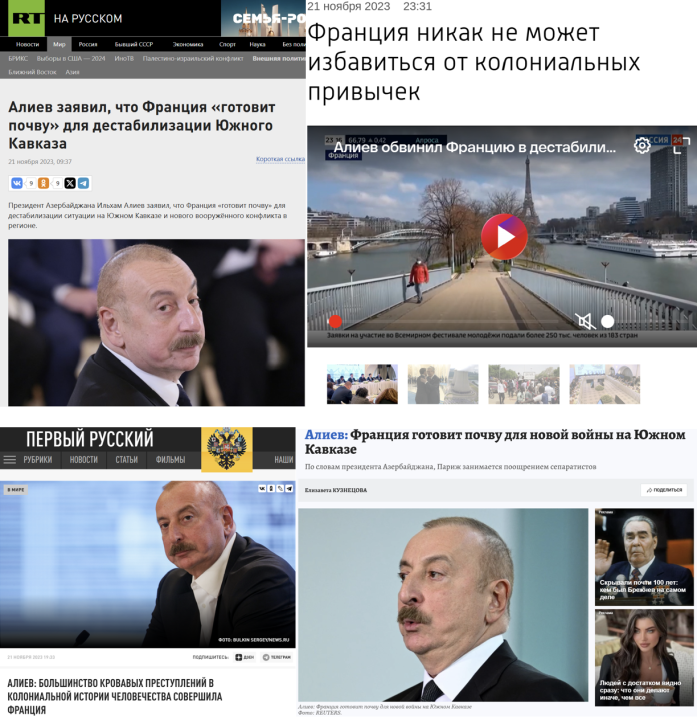
Russia and Azerbaijan seek to delegitimize Armenia’s trilateral discussions with Europe and the US
On April 5, 2024, a trilateral meeting was held in Brussels, Belgium, involving Armenian Prime Minister Nikol Pashinyan, European Commission President Ursula von der Leyen, EU High Representative Josep Borrell, and US Secretary of State Antony Blinken. During the meeting, the European Union introduced a €270 million Resilience and Growth Plan, while the United States announced $65 million in financial assistance for Armenia.
As in previous cases, Russian and Azerbaijani leaders expressed strikingly similar claims about the meeting. Ilham Aliyev claimed the Brussels gathering was intended to undermine regional cooperation and to “create dividing lines and isolate Azerbaijan.” Similarly, Maria Zakharova criticized the participants and asserted that the meeting was “against Russia.” She accused it of attempting to “draw new dividing lines in the South Caucasus” and push an anti-Russian agenda on the region. Zakharova also accused the West more broadly of exploiting Armenia to incite regional instability rather than promoting peace, and she reiterated Russia’s endorsement of Azerbaijan’s plan for the reintegration of Karabakh Armenians.
An analysis in Meltwater showed that on the day of the trilateral meeting, Azerbaijani media outlets published over 230 articles about the event; Russian media outlets published over 130 articles and continued publishing about it in over the following days. Given Zakharova’s harsh rhetoric toward Armenia during her regular weekly press briefings, we also decided to compare mentions of Zakharova and Armenia together in Russian and Azerbaijani media. The query identified over 3,800 mentions in Russian-language news websites and over 2,100 mentions in Azerbaijani-language media. The point at which Azerbaijani coverage exceeded Russian coverage was on April 18, coinciding with Zakharova’s regular press briefing.
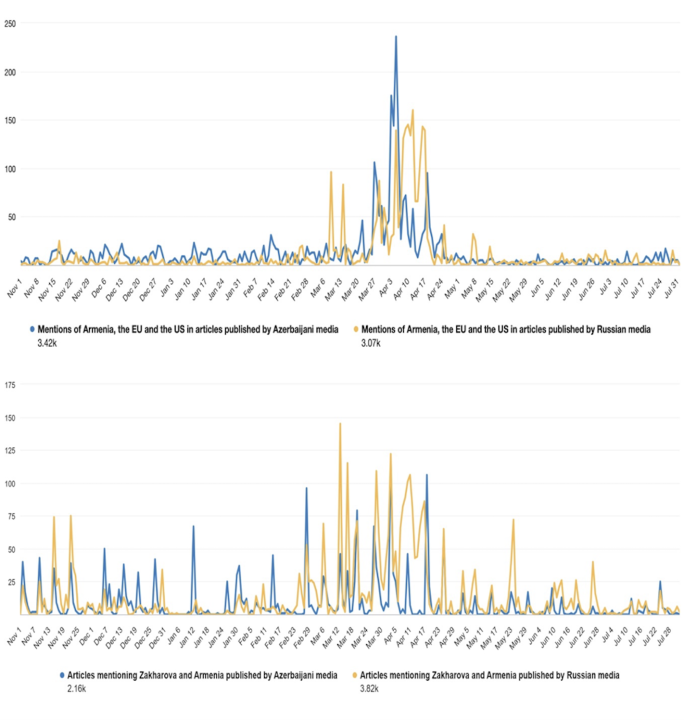
Interestingly, Zakharova’s April 18 briefing received minimal coverage in Russian media, with only 32 mentions identified via Meltwater. However, due to the alignment of her statements with Azerbaijan’s agenda, the briefing was covered 106 times in Azerbaijani-language media. In addition to standard amplification of Zakharova’s quotes, we identified nine duplicate articles with the headline “The West’s dangerous plan: what will the 10 million euros allocated to Armenia be used for?” across five Azerbaijani websites. The amount referred to a preliminary agreement between Armenia and the EU for a 10-million-euro allocation from the European Peace Facility to strengthen Armenia’s armed forces. The reports highlighted Zakharova’s comments and framed the European Union’s support as an attempt to turn Armenia into an anti-Russian platform.
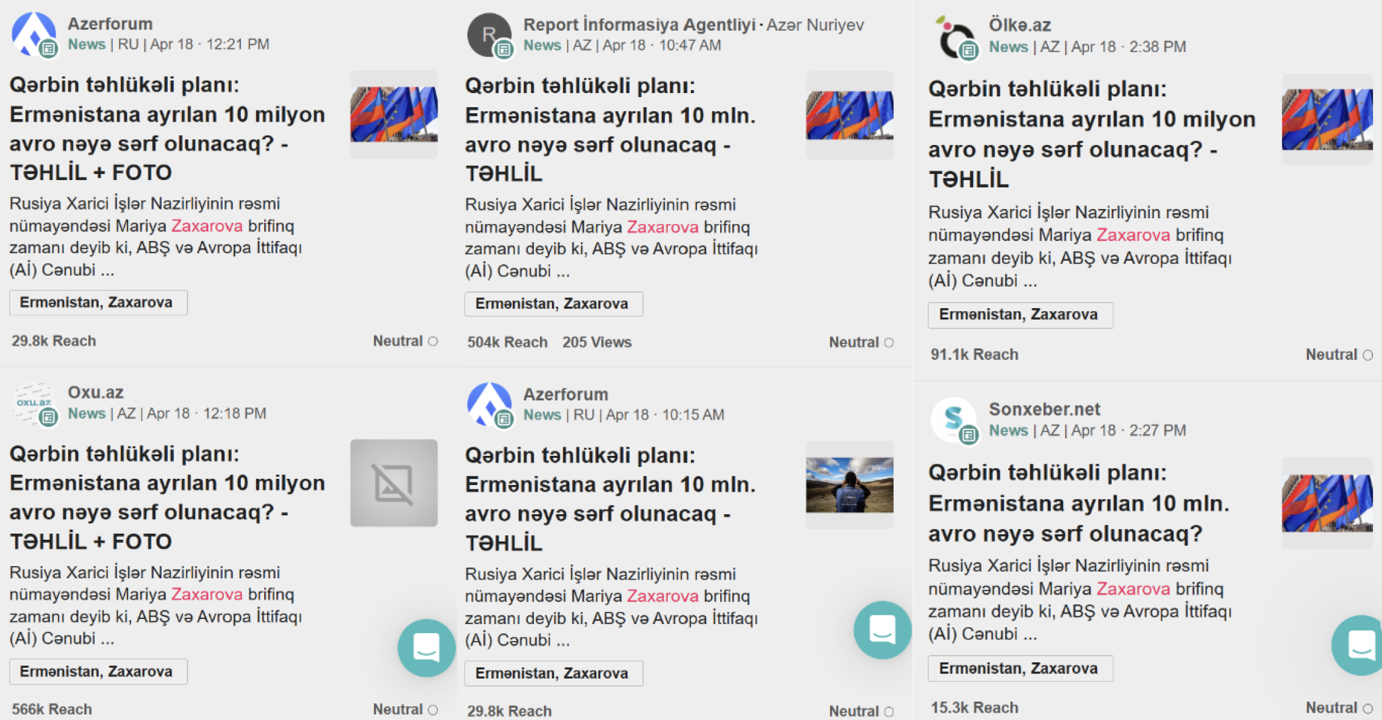
Russia and Azerbaijan push negative messages about the EU-Armenia visa liberalization dialogue
In September 2024, the European Union and Armenia began visa liberalization talks. The negotiations are anticipated to span several years, during which Armenia will need to enact comprehensive and liberal reforms to meet EU standards. A finalized visa liberalization agreement will ultimately depend on approval from both the EU Council and the European Parliament. The dialogue is expected to drive reforms in key areas such as the security of travel documents, border control, migration and asylum policies, public order, foreign relations, and the protection of fundamental rights in Armenia.
Once again, Russia and Azerbaijan disseminated similar negative messages about this event. The Russian foreign affairs ministry claimed that a visa-free regime with the European Union would “lead to a substantial outflow of young and economically active people to Europe and have a negative effect on the Armenian economy and security.” Commenting on this event, Zakharova asserted that Europe would deliberately delay the visa liberalization process, making Armenians “hostages of the Europeans’ regular political intrigues.” Along similar lines, the official Azertag news agency asserted that visa-free entry to Europe would worsen Armenia’s demographic situation and lead to the “emptying of the country.” Pro-government Azerbaijani experts made similar arguments and predictions.
The alignment of narratives in Russian and Azerbaijani media underscores a common strategy to undermine Armenia’s pro-Western aspirations. Through joint disinformation campaigns, both nations seek to delegitimize Armenia’s cooperation with the European Union. Their shared efforts serve as a reminder of the geopolitical complexities Armenia faces in its pursuit of independence and democratic reform.
Cite this case study:
Givi Gigitashvili and Sopo Gelava , “Russia and Azerbaijan’s narrative warfare against Armenia’s European path,” Digital Forensic Research Lab (DFRLab), January 15, 2024, https://dfrlab.org/2025/01/15/russia-and-azerbaijans-narrative-warfare-against-armenias-european-path/.

